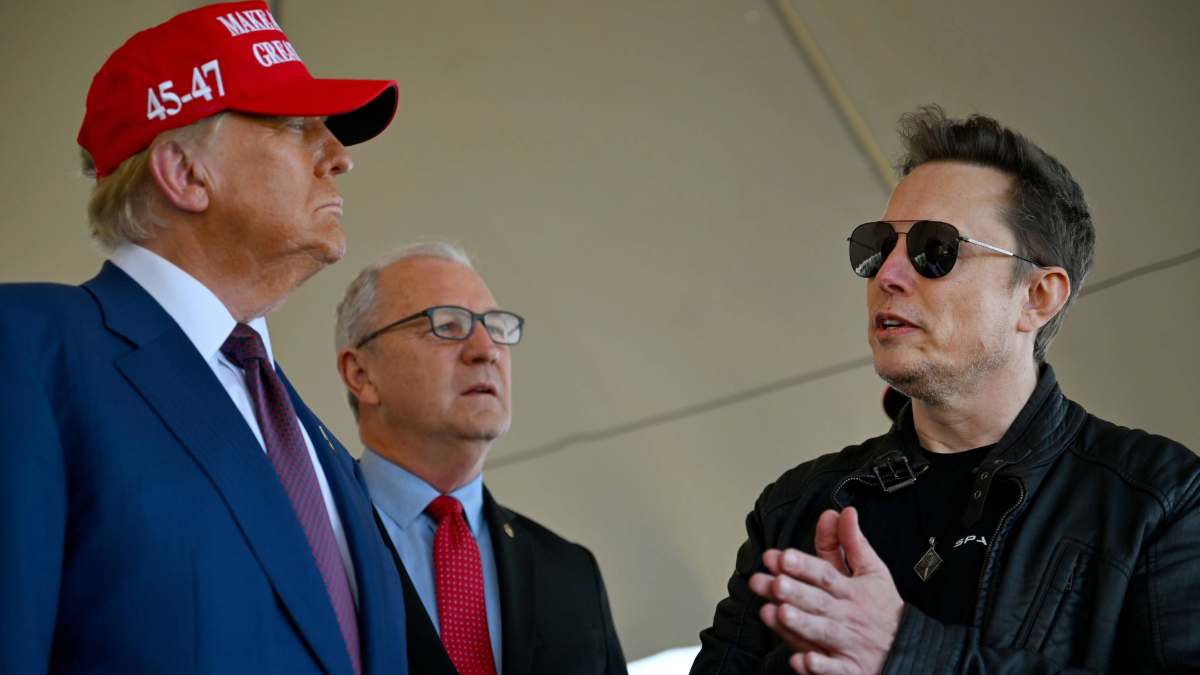On the Coming Merger of Tech and State Power
Taylor Owen / Nov 26, 2024
BROWNSVILLE, TEXAS - NOVEMBER 19, 2024: US President-elect Donald Trump speaks alongside Elon Musk (R) and Senate members including Sen. Kevin Cramer (R-ND (C) before attending a viewing of the launch of the sixth test flight of the SpaceX Starship rocket. (Photo by Brandon Bell/Getty Images)
I spent the past week in the UK and Europe talking to people in the tech and democracy community about the implications of the 2024 US election. It’s safe to say that there is deep concern about what's coming – not just the usual hand-wringing about tech's impact on democracy – but something more fundamental. What many see on the horizon is an unprecedented fusion of Silicon Valley's power with state authority that could reshape how we govern technology globally.
Let me explain.
First, the relationship between tech companies and Washington is transforming into something we haven't seen before. While Silicon Valley has always wielded influence in American politics, what's emerging now is different – a world where the interests of select technology companies become indistinguishable from US government policy.
Look at Elon Musk's growing empire. Tesla, Starlink, X, and Neuralink all stand to benefit substantially from this new alignment. They won't be alone. Peter Thiel's Palantir and Palmer Luckey's Anduril are perfectly positioned to collect expanded defense contracts, while major venture capital cryptocurrency investments are likely to see favorable regulatory treatment. The concentration of power in these companies' hands isn't just about market dominance, it's about shaping the very rules of our digital future.
But this realignment also creates clear winners and losers. Tech companies seen as oppositional to this new order are already facing challenges. Musk's expansion of his lawsuit against OpenAI to include Microsoft is just the beginning. Meta and Amazon's futures remain uncertain, shaped by President-elect Trump's long-standing antagonism toward Mark Zuckerberg and Jeff Bezos. The tech landscape is being redrawn along political lines, with profound implications for innovation and competition.
Second, for democratic nations outside the US, this power shift threatens their very ability to govern digital spaces. The mechanism is simple but effective: bilateral trade agreements will be wielded to override local attempts at tech regulation and enforcement.
We're already seeing this play out in Canada. Our News Media Bargaining Code, Online Streaming Act, and Digital Services Tax face mounting US trade challenges. When USMCA renegotiation inevitably comes, any Canadian government – regardless of political stripe – will likely have to choose between trade relations and digital sovereignty. It's a choice that puts our entire digital policy agenda at risk.
The ripple effects are global. Countries worldwide will think twice before developing new digital policies and likely slow or weaken enforcement of those already in place. Europe, with its robust regulatory framework, is very unlikely to enforce Digital Services Act obligations against X. The chilling effect on digital governance could last for years, leaving a regulatory vacuum filled only by US corporate interests.
Third, we're witnessing a systematic dismantling of the research infrastructure studying these very issues, ironically being done in the name of free speech. The tech and democracy research community faces unprecedented pressure, combining governmental investigations with corporate intimidation. Rep. Jim Jordan’s (R-OH) investigations into the communication of researchers are a harbinger of what’s to come. Marc Andreessen and Musk have both called for research working on election interference and misinformation to be prosecuted, and President-elect Trump has called for the suspension of non-profit status to universities that have housed this work. Faced with this kind of existential threat, universities are very likely to abandon these scholars and their labs.
The impact is already visible. Several prominent academic labs studying social media manipulation have lost funding or closed entirely. Civil society organizations face similar pressure – the Digital Democracy Institute recently suspended operations after sustained legal threats over their platform accountability work. This couldn't come at a worse time. Just when we desperately need to understand how information flows through our digital ecosystem, we're watching the systematic silencing of the very experts who study these questions. Again, this censorship and persecution of academic freedom is being done in the name of free speech.
Fourth, this shifting landscape is likely force a fundamental rethink of national communications infrastructure. For decades, U.S.-based platforms have dominated global communications – a model justified by globalization and market efficiency. But as media power concentrates in the hands of individual billionaire owners who've shown questionable platform stewardship, countries are sure to question this arrangement. We may see the re-emergence of a nationalist media infrastructure politics, protecting countries from US-controlled and unregulated media.
And the stakes are rising. As Section 230 faces potential weakening and US broadcast licensing undergoes dramatic changes, more nations may move to enforce their digital borders. The question becomes pressing: Does a country want to hand its media infrastructure over to individuals who've shown careless disregard for the platforms they already control? Information sovereignty, once dismissed as digital protectionism, may increasingly be seen as crucial to democratic independence.
Finally, there's the wild card of AI governance. The evolution in tech leaders' positions is telling. In 2018, Musk warned the US Congress about AI being humanity's "biggest existential threat" and advocated for proactive regulation. At OpenAI's founding, he championed democratic oversight of AI development. Now? He's launched xAI while focusing his criticism on alleged political bias in AI models.
This shift mirrors broader changes in Silicon Valley's approach to AI governance. Much of the conversation has moved from existential risk and safety protocols to market competition against Chinese AI and ideological concerns about AI's perceived political leanings. In a second Trump term, with Musk leading government downsizing efforts (DOGE), AI may be viewed more as a tool to replace federal workforce labor than a technology requiring careful oversight.
The implications are profound. Instead of the US building new regulatory frameworks for AI development, we might see existing oversight mechanisms dismantled entirely. This could accelerate AI deployment, including unchecked use by the government while reducing accountability – a combination that democracy advocates rightly worry about.
For those of us who have long studied the relationship between tech and political power, the path ahead is daunting but clear. This merger of state and tech power isn't just another shift in the landscape. It's a fundamental challenge to democratic governance in the digital age. The work of protecting democratic values in this new landscape has only just begun.
Related Reading
Authors
